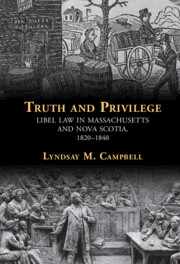Book contents
- Truth and Privilege
- Studies in Legal History
- Truth and Privilege
- Copyright page
- Contents
- Tables
- Foreword – The Osgoode Society for Canadian Legal History
- Acknowledgments
- 1 Introduction
- 2 The Common Law’s Diverging Paths
- 3 The Transformation of Privilege
- 4 Truth, Privacy and Authority
- 5 The Individual Conscience and Blasphemous and Obscene Expression
- 6 Private Defamation Suits
- 7 Conclusion
- Book part
- Bibliography
- Index
- Publications of the Osgoode Society for Canadian Legal History
5 - The Individual Conscience and Blasphemous and Obscene Expression
Published online by Cambridge University Press: 16 December 2021
- Truth and Privilege
- Studies in Legal History
- Truth and Privilege
- Copyright page
- Contents
- Tables
- Foreword – The Osgoode Society for Canadian Legal History
- Acknowledgments
- 1 Introduction
- 2 The Common Law’s Diverging Paths
- 3 The Transformation of Privilege
- 4 Truth, Privacy and Authority
- 5 The Individual Conscience and Blasphemous and Obscene Expression
- 6 Private Defamation Suits
- 7 Conclusion
- Book part
- Bibliography
- Index
- Publications of the Osgoode Society for Canadian Legal History
Summary
Chapter 5 describes the law regarding speech aimed at religion and morality. Against a backdrop of oppressive prosecutions and antiabolitionist violence, Massachusetts saw denials of the constitutionality of libel law and a rising insistence on individual rights to freedom of conscience and expression. Both the pornographic classic Fanny Hill and the first birth control texts became cheaply available in Massachusetts, and lawyers adapted the law to prosecute obscenity. Nova Scotia likely had fewer such texts, and outside Halifax legal actors also had fewer texts to refer to in drafting indictments. On the religious front, Nova Scotia’s basically voluntaristic environment made religion political, with the Anglican elite on the defensive, but disputes over belief reached neither the legislature nor courts. Massachusetts, however, gradually eliminated establishment, leaving winners and losers. Free Thinkers evoked concern, especially the Englishwoman Frances Wright, whose lectures challenged Christianity, capitalism, slavery and patriarchy. Many understood republican ideals as justifying majoritarian violence, a logic that did not resonate in Nova Scotia, where disputes centered instead on configurations of institutional power.
Keywords
- Type
- Chapter
- Information
- Truth and PrivilegeLibel Law in Massachusetts and Nova Scotia, 1820-1840, pp. 233 - 313Publisher: Cambridge University PressPrint publication year: 2021

